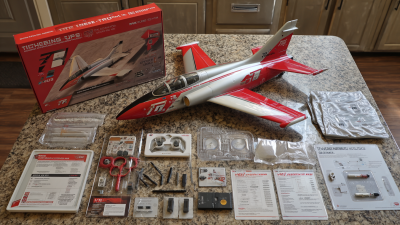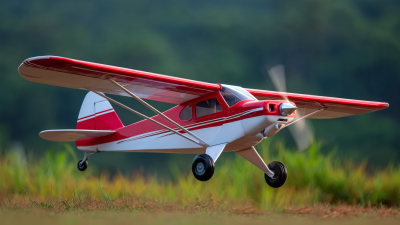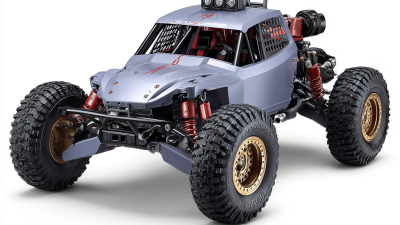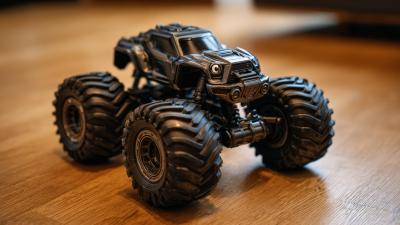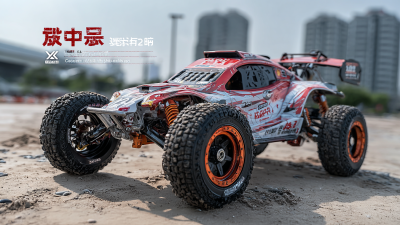The hobby of building RC airplane kits has soared in popularity, with the global remote-controlled aircraft market projected to reach over $1.7 billion by 2027, according to industry reports. As more enthusiasts of all ages take to the skies, the creation of these intricate models not only provides hours of entertainment but also stimulates cognitive development and enhances problem-solving skills.

Engaging in the assembly of RC airplane kits encourages creative thinking and fine motor skills, making it a fulfilling endeavor for hobbyists worldwide. Whether it's a simple trainer or an advanced scale model, each kit presents unique challenges and rewards, allowing builders to unleash their creativity while connecting with a vibrant community of fellow hobbyists.
As the trend continues to grow, understanding the benefits of this pastime can inspire more individuals to embark on their own aerial adventures.
Building RC airplane kits is not only a rewarding hobby but also offers significant therapeutic benefits for mental health. Engaging in this hands-on activity can help individuals focus their minds, reduce stress, and foster creativity. The process of assembling each component requires concentration and hands-on engagement, allowing builders to escape from everyday pressures and immerse themselves in a rewarding challenge.
Tip 1: Set aside regular time for building. Establishing a routine helps create a mental space dedicated to relaxation and creativity. Whether it's an hour or just a few minutes each day, consistency can enhance your overall well-being.
As you build your RC airplane, consider the meditative aspects of the activity. The repetitive nature of tasks such as sanding, painting, or wiring can create a calm and focused state of mind. This mindfulness practice can lead to improved emotional health, enabling you to feel more grounded and clear-headed.
Tip 2: Don’t rush the process. Take your time to appreciate each step, celebrating small achievements along the way. This approach not only enhances your building experience but also reinforces positive mental health by promoting patience and perseverance.

 Building RC airplane kits offers hobbyists an engaging and educational experience that significantly enhances their problem-solving skills. According to a report by the Association for Educational Communications and Technology, hands-on activities like model building promote critical thinking and creativity, pushing individuals to devise solutions to complex challenges. As enthusiasts navigate the intricacies of assembling various components, they encounter problems ranging from structural integrity to flight dynamics, requiring innovative approaches and analytical thinking.
Building RC airplane kits offers hobbyists an engaging and educational experience that significantly enhances their problem-solving skills. According to a report by the Association for Educational Communications and Technology, hands-on activities like model building promote critical thinking and creativity, pushing individuals to devise solutions to complex challenges. As enthusiasts navigate the intricacies of assembling various components, they encounter problems ranging from structural integrity to flight dynamics, requiring innovative approaches and analytical thinking.
Furthermore, a survey by the Academy of Model Aeronautics highlights that 85% of participants reported improved spatial reasoning abilities after engaging in model airplane construction. This is particularly beneficial in an era where such skills are increasingly in demand across many fields, including engineering and architecture. The iterative process of trial and error in constructing and flying their models fosters resilience, as hobbyists learn to embrace failures as part of their learning curve. Thus, building RC airplane kits not only serves as a fulfilling pastime but also equips individuals with essential skills that can have lasting impacts in their personal and professional lives.
Building RC airplane kits is more than just a solitary hobby; it cultivates a vibrant community of enthusiasts who share a passion for aerodynamics and creativity. As hobbyists gather for build sessions, swap meets, or online forums, they exchange tips, techniques, and personal stories that foster meaningful connections. These interactions not only enhance the learning experience but also create lasting friendships, bridging gaps across different backgrounds and locations.
The sense of belonging in the RC airplane community is palpable, with many clubs and organizations hosting events that provide opportunities for members to showcase their creations and take to the skies together. These gatherings inspire collaboration and innovation, as newcomers learn from seasoned builders and seasoned flyers refine their skills. Additionally, the thrill of competition during races or showcases adds a layer of camaraderie, as participants cheer each other on and celebrate their collective achievements in the art of crafting and flying model airplanes.
Building RC airplane kits offers hobbyists a unique opportunity to explore fundamental design and engineering principles. As enthusiasts assemble their models, they engage with concepts such as aerodynamics, weight distribution, and materials science. Each kit provides insights into how different shapes and sizes can influence flight performance. For instance, understanding the balance between wing size and fuselage length can lead to more efficient flight, prompting builders to experiment with variations that enhance stability and control.
Additionally, the hands-on nature of assembling these kits encourages problem-solving and critical thinking. Hobbyists learn to troubleshoot and optimize their designs, facing challenges that mimic real-world engineering dilemmas. This process not only deepens their appreciation for flight mechanics but also fosters creativity as they customize their models. By manipulating elements like thrust, drag, and lift, builders can see firsthand how theoretical principles translate into practical applications, making the hobby both educational and incredibly rewarding. Through these experiences, the world of RC airplane kits becomes a vibrant playground for aspiring engineers and creative thinkers alike.
Building RC airplane kits is not just a delightful pastime; it's also a profound learning experience. According to a report by the Federal Aviation Administration (FAA), engaging in model aircraft activities can significantly enhance spatial awareness and technical skills. As hobbyists assemble their kits, they are faced with a variety of challenges, from understanding aerodynamics to mastering electronics. This hands-on approach maximizes enjoyment by blending creativity with practical learning, making the assembly process both fun and educational.
Moreover, a study from the Academy of Model Aeronautics indicates that enthusiasts who participate in building and flying RC airplanes exhibit increased problem-solving abilities and critical thinking skills. The complexity of assembly tasks encourages individuals to think analytically, testing their designs and making adjustments based on flight performance. This iterative process is akin to real-world engineering challenges, allowing hobbyists to experience the exhilaration of bringing a concept to life while honing valuable STEM (Science, Technology, Engineering, and Mathematics) skills. The worldwide community of hobbyists amplifies this experience, as individuals can share insights, seek advice, and celebrate successes together, reinforcing a sense of belonging and collaboration.
